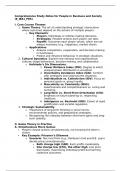Comprehensive Study Notes for People in Business and Society
(E_IBA1_PBS)
I. Core Course Themes
1. Game Theory: The art of understanding strategic interactions
where outcomes depend on the actions of multiple players.
o Key Elements:
Players: Individuals or entities making decisions.
Strategies: Possible actions each player can take.
Payoffs: Outcomes each player values, which are not
always monetary (e.g., happiness, market share).
o Applications:
Analyse competition, cooperation, and decision-making
in businesses.
Predict and influence behaviour in strategic situations.
2. Cultural Dynamics: Explore how national and organisational
cultures shape behaviours, decision-making, and collaboration.
o Hofstede’s Six Dimensions:
1. Power Distance Index (PDI): Degree to which
unequal power distribution is accepted.
2. Uncertainty Avoidance Index (UAI): Comfort
with ambiguity and unstructured situations.
3. Individualism vs. Collectivism (IDV): Focus on
personal goals vs. group loyalty.
4. Masculinity vs. Femininity (MAS):
Assertiveness and competitiveness vs. caring and
nurturing.
5. Long-Term vs. Short-Term Orientation (LTO):
Emphasis on future planning vs. respecting
traditions.
6. Indulgence vs. Restraint (IND): Extent of need
gratification and societal regulation.
3. Strategic Sustainability:
o Importance of long-term thinking in social norms,
environmental policies, and geopolitical strategies.
o Recognising the interplay between short-term gains and long-
term stability.
II. Game Theory in Practice
A. Simultaneous Move Games
Players choose actions simultaneously, not knowing the other’s
choice.
Key Example: Prisoner’s Dilemma
o Scenario: Two rival firms (e.g., Rainbow’s End and B.B. Lean)
decide prices simultaneously.
Both charge high ($80): Each profits moderately.
One charge low ($70), the other high: Low price
dominates, maximising individual profit but harming
collective outcomes.






